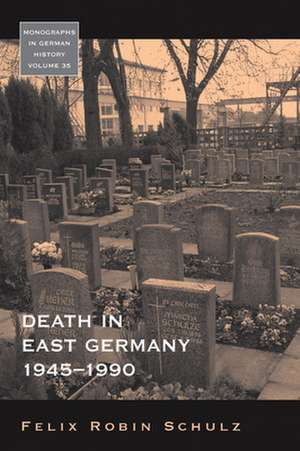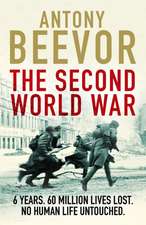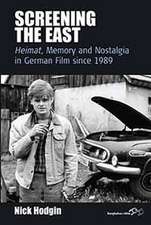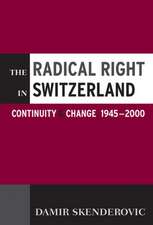Death in East Germany, 1945-1990. Felix Robin Schulz: Monographs in German History, cartea 35
Autor Felix Robin Schulzen Limba Engleză Hardback – 31 aug 2013
Din seria Monographs in German History
-
 Preț: 261.56 lei
Preț: 261.56 lei -
 Preț: 158.76 lei
Preț: 158.76 lei - 23%
 Preț: 747.68 lei
Preț: 747.68 lei -
 Preț: 220.52 lei
Preț: 220.52 lei -
 Preț: 259.27 lei
Preț: 259.27 lei - 23%
 Preț: 836.06 lei
Preț: 836.06 lei -
 Preț: 261.56 lei
Preț: 261.56 lei -
 Preț: 261.38 lei
Preț: 261.38 lei - 23%
 Preț: 748.57 lei
Preț: 748.57 lei - 23%
 Preț: 746.35 lei
Preț: 746.35 lei - 23%
 Preț: 836.52 lei
Preț: 836.52 lei - 23%
 Preț: 751.25 lei
Preț: 751.25 lei - 23%
 Preț: 749.49 lei
Preț: 749.49 lei -
 Preț: 219.20 lei
Preț: 219.20 lei - 23%
 Preț: 744.71 lei
Preț: 744.71 lei - 23%
 Preț: 747.55 lei
Preț: 747.55 lei -
 Preț: 261.93 lei
Preț: 261.93 lei -
 Preț: 261.93 lei
Preț: 261.93 lei - 23%
 Preț: 750.96 lei
Preț: 750.96 lei - 23%
 Preț: 751.71 lei
Preț: 751.71 lei -
 Preț: 303.88 lei
Preț: 303.88 lei - 23%
 Preț: 746.06 lei
Preț: 746.06 lei - 23%
 Preț: 749.15 lei
Preț: 749.15 lei - 23%
 Preț: 749.15 lei
Preț: 749.15 lei -
 Preț: 264.64 lei
Preț: 264.64 lei - 23%
 Preț: 748.57 lei
Preț: 748.57 lei -
 Preț: 258.50 lei
Preț: 258.50 lei - 23%
 Preț: 749.02 lei
Preț: 749.02 lei -
 Preț: 156.22 lei
Preț: 156.22 lei -
 Preț: 257.30 lei
Preț: 257.30 lei - 23%
 Preț: 748.27 lei
Preț: 748.27 lei -
 Preț: 259.80 lei
Preț: 259.80 lei - 5%
 Preț: 921.55 lei
Preț: 921.55 lei - 23%
 Preț: 751.25 lei
Preț: 751.25 lei - 23%
 Preț: 746.06 lei
Preț: 746.06 lei -
 Preț: 298.50 lei
Preț: 298.50 lei -
 Preț: 265.20 lei
Preț: 265.20 lei
Preț: 749.15 lei
Preț vechi: 972.93 lei
-23% Nou
Puncte Express: 1124
Preț estimativ în valută:
143.35€ • 149.38$ • 118.69£
143.35€ • 149.38$ • 118.69£
Carte tipărită la comandă
Livrare economică 03-17 aprilie
Preluare comenzi: 021 569.72.76
Specificații
ISBN-13: 9781782380139
ISBN-10: 1782380132
Pagini: 248
Dimensiuni: 152 x 229 x 16 mm
Greutate: 0.5 kg
Editura: BERGHAHN BOOKS INC
Seria Monographs in German History
ISBN-10: 1782380132
Pagini: 248
Dimensiuni: 152 x 229 x 16 mm
Greutate: 0.5 kg
Editura: BERGHAHN BOOKS INC
Seria Monographs in German History
Notă biografică
Felix Robin Schulz is Lecturer in Modern European History at Newcastle University. He has taught at Lancaster University, the University of York, and Sunderland University. His research interests include the history of sepulchral cultures, regional and national memorialization, and the link between landscape and identity. He has published on death and disposal in East Germany as well on the history of the Alps.
Cuprins
List of Illustrations List of Tables and Figures Acknowledgements Glossary Introduction Chapter 1. The Origins of Modern German Sepulchral Culture Chapter 2. After Death: The Organization of Disposal Chapter 3. Resting Places? Cemeteries in the GDR Chapter 4. Burning Bodies: Cremation in the GDR Chapter 5. The Communal Burial of Ashes: 'New' Spaces for Disposal Chapter 6. Funerals in the GDR: A Diversity of Rituals Conclusion Bibliography Index
Recenzii
"Felix Robin Schulz's insightful and thoroughly researched book makes a significant contribution to the growing scholarship on the history of East Germany. It is, to my knowledge, the most comprehensive study of sepulchral culture in the GDR. Schulz is to be strongly commended for his extensive archival research in Berlin and in a number of city archives. He also visited numerous sites personally, which lends him a further layer of authority over his subject matter and allows him to make observations on how quickly certain spatial elements of socialist sepulchral culture are disappearing." * Helena Toth, Ludwig Maximilians Universitat, Munich "[A] book on a fascinating subject, and one that offers a genuinely new perspective on the history of the German Democratic Republic. It links a number of topics that are of considerable interest - Although the GDR has attracted an enormous historical literature over the past couple of decades, the subject here has not been investigated until now - no one has attempted anything like this before - a book that links, among other things, the social aftermath of Nazism, the political history of the German Democratic Republic, the long-term developments in funeral and burial practices and cultures, and the relations between church and state in the GDR." * Richard Bessel, University of York













